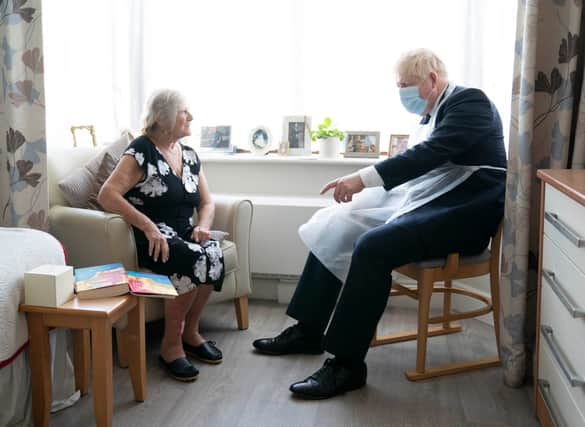These are the new rules on the social care cap in England


New rules on the social care cap in England have been announced, with the government confirming support payments made by councils will not count towards a recipient’s personal limit.
It had previously been announced that as part of a new social care cap, no one in England would pay more than £86,000 in care fees during their lifetime.
Advertisement
Hide AdAdvertisement
Hide AdHowever, it has now been confirmed only the amount directly contributed will count towards this £86,000 cap.
What is the social care cap?
In September 2021, it was announced those living in England would not be expected to pay any more than £86,000 in their lifetime for social care costs.
The cap is set to come into place in October 2023.
The government also announced those with assets up to £20,000 will not need to contribute directly to their care, and that those with assets up to £100,000 will be eligible to receive financial help from their local authority.
The cap came after Boris Johnson pledged during his election campaign in 2019 that no one would need to sell their home to pay for care under a Conservative government.
What does the new rule say?
Advertisement
Hide AdAdvertisement
Hide AdNow, the government has said the money received from local authorities will not go towards the £86,000 cap, which covers everyone who received care in England.
In the document published detailing the new rule, it said: It says: “For individuals who receive financial support for their care costs from their local authority, it is the amount that the individual contributes towards these costs that will count towards the cap, subject to parliamentary approval.”
The announcement was expected to include a combination of all social care costs, including council support funds. However, the Department of Health and Social Care has now confirmed that this will only include direct contributions from individuals.
Will the new rule benefit more people?
Despite Johnson and the conservatives saying the new rule makes the social care system fairer, many have criticised the move.
Advertisement
Hide AdAdvertisement
Hide AdLiz Kendall, Labour’s shadow social care minister, also criticised the plans, claiming that the Tories had “failed” England’s pensioners.
She said: “It has now been revealed that the poorest pensioners will have to pay even more, something Andrew Dilnot – who proposed the cap – explicitly ruled out because it was so unfair.
“That this Tory Government has failed to be straight with those who’ve given so much to our country is a total disgrace, but utterly unsurprising. Our elderly people deserve better.”
Torsten Bell, chief executive of the Resolution Foundation, also added that the new rule will “reduce how much protection the cap provides to those with fewer assets, by making it less likely that they could benefit from the cap”.
Advertisement
Hide AdAdvertisement
Hide AdHe said: “The Government is rightly making long overdue reforms to better protect the assets of those unlucky enough to need social care support, with a more generous means test and cap on total costs.
“But the Government is now seeking to change how the means test and cap interact, leaving people with fewer assets receiving far less protection than expected.
“What sounds like a technical change will actually make a huge difference to how much families have to pay for care.
“The danger is that the cap on care costs will now offer little protection for poorer households’ assets, while doing much more for those with significant assets – especially in the south of England. We need far greater scrutiny of such a major change.”